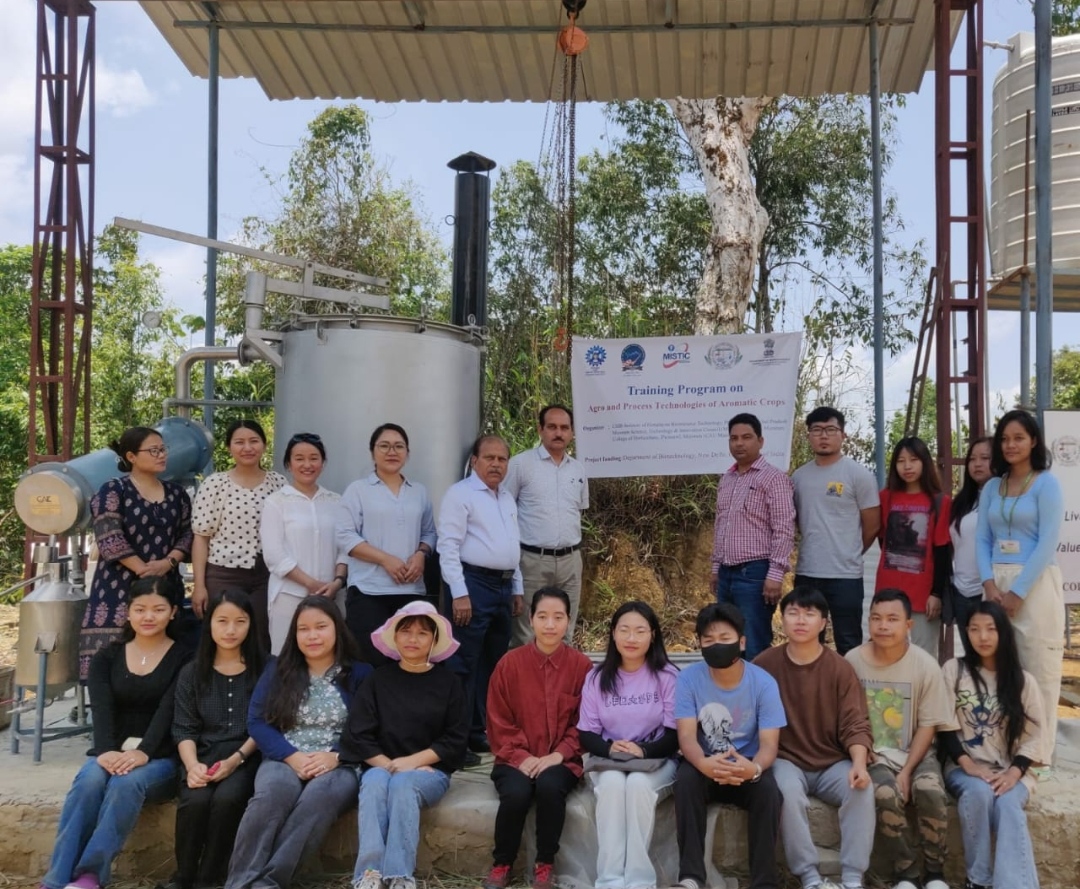Interventions in Mizoram for enhancing the livelihood of tribal population by CSIR-IHBT Palampur
![]()
CSIR-Institute of Himalayan Bioresource Technology (CSIR-IHBT), Palampur (HP) is making efforts to revive the economy of the farming community through introduction of high value aromatic crops and low chilling varieties of apple in some potential locations of Mizoram.

To implement the project sponsored by Department of Biotehnology, Govt of India, CSIR-IHBT joins hands with College of Horticulture, Thenzawl, Mizoram (a constituent college of Central Agricultural University, Imphal, Manipur) and Mizoram Science Technology and Innovation Council (MISTIC). CSIR-IHBT team visited Mizoram from May 24-27, 2023 for monitoring the growth of aromatic plants and low chilling varieties of apples planted in different locations in Mizoram and College of Horticulture, Thenzawl.

Dr Probodh Kumar Trivedi, Director, CSIR-IHBT, Palampur told that the institute have been sanctioned three projects by Department of Biotechnology, Govt. of India during February 2022 under Inter- Institutional Programme Support on the development and sustainable utilization of bioresources of Mizoram Sub Project: Captive production of Shiitake and Oyster mushroom and their processing for Vitamin D2 enrichment; Sub Project 2: Introduction of low chilling varieties of apple (Malus domestica L.) in Mizoram to improve the livelihood of tribal farmers. Sub Project 3: Livelihood generation through cultivation and value addition of aromatic plants in Mizoram. He said that CSIR-IHBT have the relevant technologies on Shiitake and Oyster mushroom, high value aromatic crops and low chilling varieties of apple. These technologies are being demonstrated at farmers’ field in North Eastern state Mizoram along with partner institutes of Mizoram Science, Technology & Innovation Council (MISTIC), Aizawl and College of Horticulture, Thenzawl, Mizoram (CAU Manipur).

CSIR-IHBT team held meeting with Er. H. Lalsawmliana, Chief Scientific Officer, Mr Davy Lalruatliana, Scientific Officer and Dr. Lalchhandami Tochhawng, Scientific officer from MISTIC, Aizawl, Mizoram. Team imparted training to the farmers of village Ailawng of aspirational district Mamit and village Hmuifang of distt. Aizawl on cultivation of low chilling varieties of apple on May 25-26 2023 along with MISTIC scientific staff. Dr Davy informed that 6400 low chilling apple plants were supplied by CSIR-IHBT under the apple projects have been distributed to the beneficiary farmers in district Aizawl, Thenzawl and aspirational district Mamit during February, 2023 on pilot scale. The visiting team monitored the growth of plants and trained the farmers for apple cultivation techniques. The team observed that survival rate of plants is good and the plants are growing well.

Dr Rakesh Kumar, Senior Principal Scientist, CSIR-IHBT cum Pl of the apple and aromatic plant projects and Er Mohit Sharma (Chemical Engineer), Principal Scientist cum Co PI of the aromatic plants project visited College of Horticulture Thenzawl, Mizoram along with the Scientific officers of MISTIC. They held meeting with the scientists and Dean College of Horticulture, Thenzawl. Team observed the growth of apple plants, aromatic plants viz., lemongrass, citronella and damask rose along with MISTIC staff. Dr Rakesh Kumar told that the essential oil obtained from the aromatic plants is traded in the international markets for use in perfumery, flavouring, pharmaceutical and pesticide industries. A training program on agro and process technology of aromatic plants was imparted to the scientists and students of College of horticulture, Thenzawl, farmers and staff of horticulture, Thenzawl, Mizoram. Practical demonstration of essential oil extraction froml emongrass was also given to the trainees on May 26, 2023. More than 60 farmers, horticulture students and scientists participated in these training. Team also monitored the growth of apple plants planted in demonstration plot of College of Horticulture, Thenzawl under the project.

The market potential of aromatic plants is huge as these has an extensive range of uses from insect repellent properties, anti- inflammatory, antifungal and antibacterial characteristics, which make it useful in numerous applications like control of store grain insect pests, wound healing and treatment of eczema, diaper rash, psoriasis and for skin ointment.

Presently, most of the essential oil requirements in India are met through imports from countries such as China, Indonesia, Turkey, France, Kenya, Brazil and Australia.


